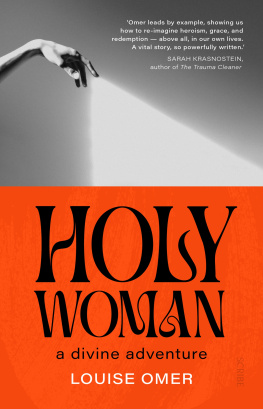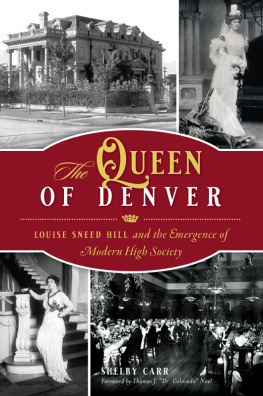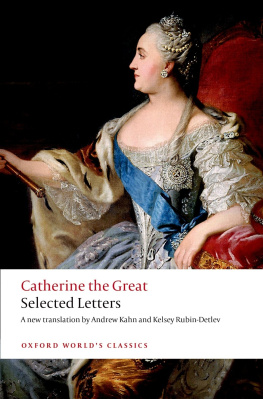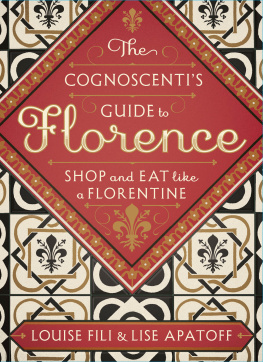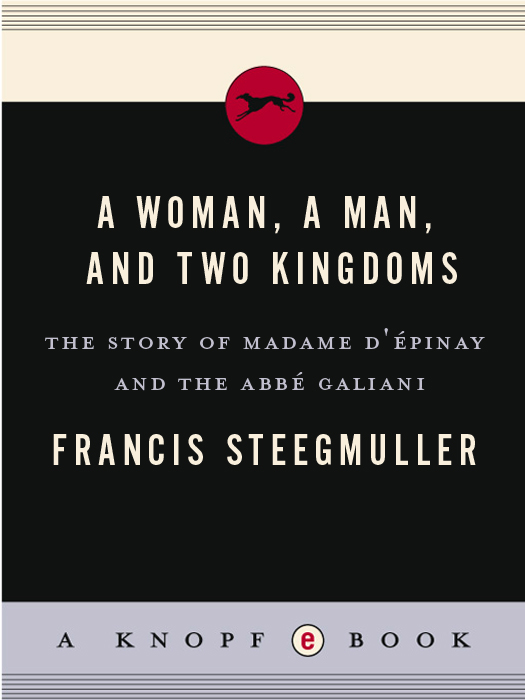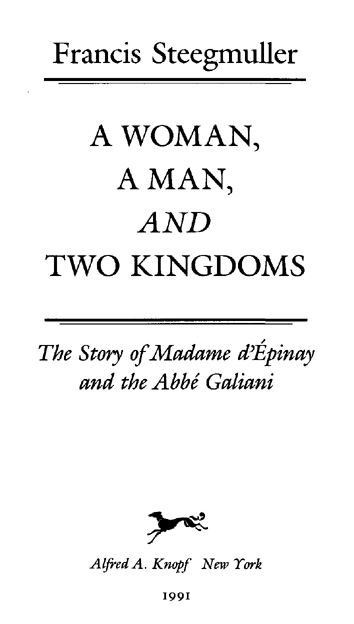Also by Francis Steegmuller
COCTEAU : A BIOGRAPHY
YOUR ISADORA : THE LOVE STORY OF ISADORA DUNCAN AND GORDON CRAIG
APOLLINAIRE : POET AMONG THE PAINTERS
THE CHRISTENING PARTY
THE GRAND MADEMOISELLE
THE TWO LIVES OF JAMES JACKSON JARVES
MAUPASSANT : A LION IN THE PATH
FLAUBERT AND MADAME BOVARY : A DOUBLE PORTRAIT
SILENCE AT SALERNO : A COMEDY OF INTRIGUE
STATES OF GRACE
FRENCH FOLLIES AND OTHER FOLLIES
THE MUSICALE
Under the name Byron Steel
O RARE BEN JONSON
JAVA-JAVA
SIR FRANCIS BACON
Under the name David Keith
A MATTER OF IODINE
A MATTER OF ACCENT
BLUE HARPSICHORD
(later reprinted in paperback under the name Francis Steegmuller)
Translations
THE SELECTED LETTERS OF GUSTAVE FLAUBERT
MADAME BOVARY
GUSTAVE FLAUBERT : INTIMATE NOTEBOOK , 1840 1841
PAPILLOT, CLIGNOT ET DODO (with Norbert Guterman)
SAINTE-BEUVE : SELECTED ESSAYS (with Norbert Guterman)
FLAUBERT IN EGYPT
LE HIBOU ET LA POUSSIQUETTE
THE LETTERS OF GUSTAVE FLAUBERT , 1830 1857
THE LETTERS OF GUSTAVE FLAUBERT , 1857 1880
THIS IS A BORZOI BOOK
PUBLISHED BY ALFRED A. KNOPF, INC.
Copyright 1991 by Francis Steegmuller
All rights reserved under International and Pan-American Copyright Conventions. Published in the United States by Alfred A. Knopf, Inc., New York, and simultaneously in Canada by Random House of Canada Limited, Toronto. Distributed by Random House, Inc., New York.
eISBN: 978-0-8041-5132-0
LC 91-52801
v3.1
For L ILIANE and O LIVIER Z IGEL ,
in long friendship
CONTENTS
ILLUSTRATIONS
Private collection
Collection Lalive dpinay, Comte G. de Bueil
Muse Cond, Chantilly
Naples, Museo Nazionale di San Martino
Muse Cond, Chantilly
Muse Cond, Chantilly
Muse Cond, Chantilly
Muse Cond, Chantilly
Muse Cond, Chantilly
Bibliothque Nationale, Paris
AUTHORS NOTE
D URING the several years that elapsed between the conception of the present book and its completion, I was helped by innumerable friends, acquaintances, and strangers, and am grateful to them all.
My particular thanks go to my wife, Shirley Hazzard; and to the Rvrend Pre Jean-Pierre Jossua, Liliane Zigel, Patrizia Antignani, Elisabeth Sifton, Harry Ford, Carlo Knight, and the late Roberto Pane.
I also wish to thank George Andreou, Colin Bailey, Mirella and Maurizio Barracco, Jacques Barzun, Maria Elena Bertoldi, Clara Binswanger, Erse and Leroy Breunig, Victor Brombert, Morton N. Cohen, Giulio Colavolpe, James Coulter, Benedetta Craveri, Olivier Lalive dpinay, Everett Fahy, the late Brian Fothergill, Marcello Gigante, Lily Gravino, George Jellinek, Martin Kreeb, Raffaele LaCapria, John A. Marino, William Maxwell, Franca and the late Benedetto Nicolini, Robert Pounder, Richard Swift, William F. Weaver, and Ruth Plaut Weinreb. Other acknowledgments are incorporated in the notes.
Among the numerous libraries to which I am indebted, I wish especially to thank the New York Public Library and the libraries of Columbia University and Harvard University; in Naples, the Biblioteca Nazionale and the libraries of the Universit degli Studi and the Societ Napoletana di Storia Patria; in New York, the New York Society Library, the Morgan Library, and the library of the French InstituteAlliance Franaise.
PREFACE
T ALLEYRAND S assertion that anyone who had not lived in pre-Revolutionary France could not fully know lifes pleasureQui na pas vcu dans les annes voisines de 1787 ne sait pas ce que cest le plaisir de vivreis the most familiar of many tributes to the quality of a society that still exercises its fascination over the modern mind. That this civilized well-being had been enjoyed by privileged classes within a darker context of suffering, exploitation, and injustice was traumatically illustrated by the Revolution itself, and by the deranged excesses of the ensuing Terror. Yet the pleasures to which Talleyrand alluded were not the merely frivolous and selfish amusements of courtiers or persons of great wealth.
Talleyrand was thinking, above all, of a social and intellectual flowering that, ever extending its boundaries, has caused the age to be called that of Enlightenment, creating, as it did, an increase in human consideration, as distinguished from formal manners. Limitations on friendshipbetween classes, sexes, and generationswere eased, as was objective discussion. The circles enjoying these changes were intimate but not parochial; their companionable discussions were often subtle, and didactic in no baneful sense. Civilized conduct, which encompassed wit, self-humor, and sociability, necessarily excluded bombast. And the presence of women in an activeat times, a presidingrole contributed a new measure of incisiveness, sensibility, and grace.
This prospering of knowledge in an ambiance not only of unaffected charm but of keen observation and diverse genius could no more have been imagined, at the time, as a prelude to the violence that erupted in 1789 than the Belle poque, with its parallel currents of privilege, social consciousness, and reform, could have been interpreted by its denizens as an overture to the immense tragedy of the First World War. Writing, in 1779, of ancient Gaul, Edward Gibbon contrasted the aspect of that province with the present state of the same country, as it is now governed by the absolute monarch of an industrious, wealthy and affectionate people. Dean Milman, in one of his notes to Gibbons history, called attention to that remarkable passage, and, in particular, to the date of its compositionten years before the fall of the Bastille and twelve before the beheading of the absolute monarch by the representatives of his affectionate people. In a later chapter of his history, Gibbon wrote: In France, the remains of liberty are kept alive by the spirit, the honour, and even the prejudices of fifty thousand nobles. Here Gibbon is referring to the resistance, in 1787, by portions of the French nobility, to that same Bourbon absolutism. This resistance to the royal power caused many French peers, early in the Revolution, to espouse a number of the revolutionary reformsonly, as events accelerated, to find their support rejected and themselves condemned to the guillotine.
A few years after Gibbon had extolled, in this way, the condition of France, Johann Wolfgang von Goethe was visiting Naples, then the capital of a powerful kingdom ruled by another branch of the house of Bourbon. Naples is a paradise, he wrote to a friend on 16 March 1787. Everyone lives in a state of intoxicated self-forgetfulness, myself included. I seem to be a different person, whom I hardly recognize. Yesterday I thought to myself, Either you were mad before, or you are mad now. Once again, as with Gibbon and France, the foreigners praise came a decade before the convulsion. The story of the Neapolitan revolution of 1799 is not familiar outside Italybecause of its brevity, and also because its disastrous cultural consequences long weakened Napless intellectual communion with the world. The so-called Parthenopean Republic, proclaimed by the Neapolitan bourgeoisie and intelligentsia in January 1799 and temporarily supported by French republican troops, lasted barely six months; reprisals by the re-established monarchswho had, for a time, fled to Sicilywere so savage as to inhibit the life of the mind at Naples for decades to come.



